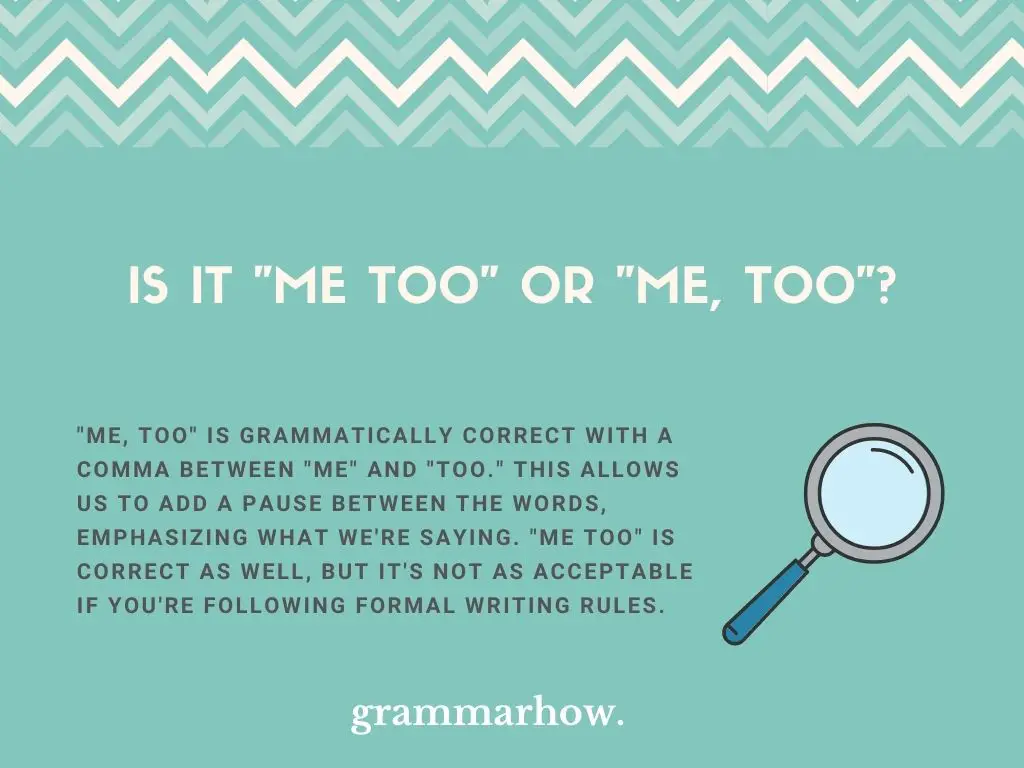Using a comma is a confusing thing in English. There seem to be many contradicting rules about whether phrases like “me too” need a comma between the two words. This article will explain all you need to know about the forms.
Is It “Me Too” Or “Me, Too”?
“Me, too” is grammatically correct with a comma between “me” and “too.” This allows us to add a pause between the words, emphasizing what we’re saying. “Me too” is correct as well, but it’s not as acceptable if you’re following formal writing rules.

The biggest difference is that “me too” doesn’t require a pause between the two words. It’s more common to see someone use this when they want to quickly interject:
- I’m going to see them tonight.
- Me too.
Is It Incorrect To Use “Me, Too”?
“Me, too” is not incorrect. If anything, it’s the more appropriate variation if you want to follow strict English rules. However, native speakers don’t often include the comma because it’s seen as pretentious and redundant.
The comma doesn’t add anything extra to the sentence. It’s just a way for us to split up “me, too” with a breath or pause. That’s why so many native speakers overlook it.
You will not be told off for removing the comma yourself.
When Should I Use “Me, Too”?
“Me, too” works when following strict writing rules. You should include the comma if you want to write “me, too” in a longer sentence (one that isn’t just “me too” as an exclamation or reply).
The comma works well in longer sentences. It helps us to break it up more, where “too” becomes its own clause.
- It will affect me, too. I hope you realize that before you start doing anything stupid.
- I want her to come and see me, too. I think it would be a lot of fun with her.
- Oh, yeah. That goes for me, too. I just wasn’t sure about the best way to word it.
- Can you help me, too? I need to understand what’s going on with this question.
- It’s supposed to be for me, too. I feel like none of you care about that.
When Should I Use “Me Too”?
If we are only saying “me too” to reply to someone or agree to do something, then it makes sense to leave the comma out. It’s likely that you’ll see “me too” used as its own sentence (with no other words), and it won’t tend to have a comma in these cases.
- Me too. I’d be happy to come along to support you.
- Oh, me too! Sorry, I wasn’t paying much attention at the time.
- Me too! I want to see what you can achieve, and I think it will be good fun.
- Me too! Me too! I want to be there! Please let me come along with you.
- Me too. I offer my services to help out here.
Is It Always Correct To Use “Me Too” Without A Comma?
“Me, too” is the formal choice if you want to always be correct. However, if you’re not worried about the formality of the phrase, there’s no reason why you can’t drop the comma.
It’s always correct to use “me too” without a comma when writing informally. The only thing that you might miss out on without the comma is the need to take a quick breath or pause between the words. Sometimes, this is a good way to emphasize your point.
We can use “me too” without a comma whether we’re using it as a short sentence:
- Me too!
Or as part of a longer one:
- It will affect me too.
Quiz: Have You Mastered The Comma Rules For “Me Too”?
Finally, let’s see what you’ve learned about the rules for “me too.” Pay attention to the sentence lengths here to see if you can figure out the finer details to the answers below.
- (A. Me too / B. Me, too)! I’m happy to attend this tournament.
- I think this applies a lot to (A. me too / B. me, too). I’ll make sure to be there for your sake.
- It’s going to be hard for (A. me too / B. me, too). Why do you think I care so much?
- Oh, (A. me too / B. me, too)! Yeah. I think this is a great opportunity.
- It’s for (A. me too / B. me, too). I just didn’t know how to respond to it.
Quiz Answers
- A
- A / B
- A / B
- A
- A / B
In shorter sentences, only “me too” is used. For longer sentences, “me, too” is more formal, but “me too” works just as well informally.
You may also like:
“I too” or “I, too” – Comma Rules Explained (With Examples)
“Me Too” vs. “Me As Well” vs. “I As Well” – Difference Explained
“Mine Too” Or “Me Too”? Difference Explained (With Examples)
12 Better Ways To Say “Me Too”
Me To or Me Too? Grammar Explained (Helpful Examples)
